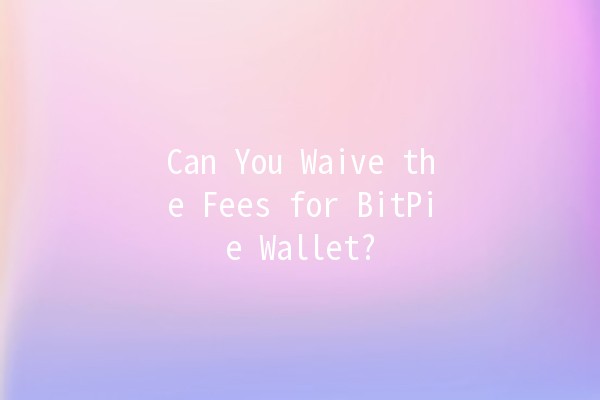
In the rapidly evolving world of cryptocurrency, wallets serve as the key to managing and orchestrating our digital assets. BitPie Wallet has gained popularity among users for its userfriendly interface and a suite of impressive features. However, one pressing question that many wallet users have is whether they can waive the fees associated with using BitPie Wallet.
This article delves into the various aspects of BitPie Wallet fees, how they work, and explores some practical tips on potentially reducing or waiving those fees altogether. We'll also discuss the productivityboosting strategies that can enhance your experience while managing your cryptocurrency.
Understanding BitPie Wallet Fees
Before we dive into the specifics of fee waivers, it's crucial to understand the types of fees associated with cryptocurrency wallets like BitPie. Generally, there are two primary categories of fees:
These fees are charged whenever you conduct a transaction, whether it's sending or receiving cryptocurrencies. Transaction fees are often dictated by the blockchain network and can vary greatly depending on network congestion.
These fees are charged by the wallet service provider for using their platform. This could include fees for conversion, withdrawals, or any other services offered within the wallet.

Understanding these fees is vital, as it sets the foundation for exploring ways to minimize or potentially eliminate them.
Can BitPie Wallet Fees Be Waived?
The short answer is: it depends. BitPie Wallet does not directly allow users to waive fees at their discretion. However, there are strategies users can employ to minimize costs effectively.
Strategies to Reduce or Waive Fees
Here are five practical tips to help you reduce or manage your fees when using BitPie Wallet:
Explanation: Transaction fees fluctuate based on network demand. By monitoring the network conditions, users can find optimal times to conduct transactions when fees are lower.
Practical Application: Use websites like EthGasStation or similar blockchain analytics sites to check current gas prices and schedule your transactions accordingly.
Explanation: Some cryptocurrencies have lower transaction fees compared to others. For instance, ERC20 tokens often have higher fees than Ethereum itself.
Practical Application: When engaging in transactions, consider using major currencies like Bitcoin or Ethereum, as their transaction structures may provide better fee efficiency.
Explanation: Often, wallet providers run promotions where they temporarily waive certain fees to attract users.
Practical Application: Keep an eye on BitPie’s promotions and community announcements, so you don’t miss out on opportunities to reduce costs.
Explanation: Instead of conducting multiple small transactions, try to batch your transactions into one larger transaction to save on costs.
Practical Application: If you need to send smaller amounts to multiple recipients, assess whether it's possible to consolidate these into a single transaction which would likely incur fewer fees.
Explanation: An updated wallet can offer the latest protocols and transaction algorithms that may help in reducing fees.
Practical Application: Make sure your BitPie Wallet application is always up to date. This can prevent you from missing out on potentially optimized features and functions aimed at reducing fees.
Additional Considerations for Fee Management
Apart from the above strategies, here are a few other considerations that will help enhance your experience using BitPie Wallet:
Frequently Asked Questions
BitPie Wallet charges two main types of fees: transaction fees for sending and receiving cryptocurrency, which vary by blockchain network, and service fees for functionalities offered within the wallet.
You can minimize fees by monitoring network conditions, using major cryptocurrencies, batching transactions, and taking advantage of promotions or lower traffic times.
While specific transactions may occasionally be offered for promotional purposes, most standard actions within the wallet incur some form of fee.
Typically, wallet fees are standardized according to network protocols and service agreements. It's unlikely you'll be able to negotiate fees directly with customer support.
Regular updates ensure that you have access to the latest features and optimizations, which may include improvements affecting transaction speed and fee efficiency.
Batching involves collecting multiple transactions and executing them as one. Evaluate your sending needs and
consolidate smaller transfers into fewer larger ones as often as possible to effectively manage fees.
, while it may not be possible to completely eliminate fees associated with BitPie Wallet, understanding their structure and implementing strategic practices can certainly reduce them significantly. By employing these methods and staying engaged with the crypto community, users can make the most out of their wallet experience.

